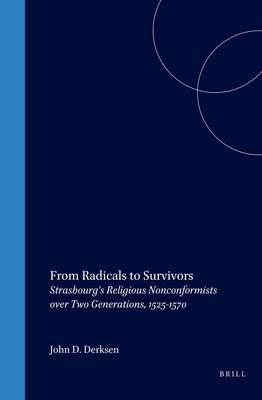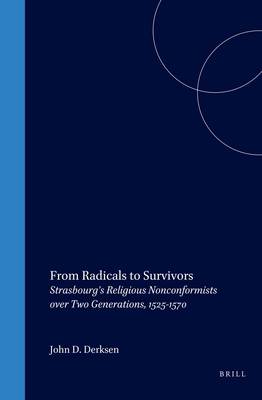
Je cadeautjes zeker op tijd in huis hebben voor de feestdagen? Kom langs in onze winkels en vind het perfecte geschenk!
- Afhalen na 1 uur in een winkel met voorraad
- Gratis thuislevering in België vanaf € 30
- Ruim aanbod met 7 miljoen producten
Je cadeautjes zeker op tijd in huis hebben voor de feestdagen? Kom langs in onze winkels en vind het perfecte geschenk!
- Afhalen na 1 uur in een winkel met voorraad
- Gratis thuislevering in België vanaf € 30
- Ruim aanbod met 7 miljoen producten
Zoeken
From Radicals to Survivors
Strasbourg's Religious Nonconformists Over Two Generations, 1525-1570
John D Derksen
€ 322,45
+ 644 punten
Omschrijving
This is the first extensive study of Strasbourg's diverse religious nonconformists beyond 1543, and the first to explore their continuities and discontinuities over two generations. Based on vast archival records in Strasbourg and secondary sources, it moves beyond the political and theological emphases of earlier works to include social history, portraits of village life, and the second generation to 1570.
Derksen finds that second generation nonconformists were substantially different from the first. Their social profile changed; from an urban mix of leaders, intellectuals and artisans, they became largely rural folk composed of lower class artisans. Further, in outlook their view narrowed from "radicals" who sought to change church and society at its root to dissenters concerned mainly to survive.
At the same time there were continuities. When the revolts of the 1525 Peasants' War were crushed, dissident ideals found new expression in spiritualist, sectarian and apocalyptic streams. In these streams, into the 1560s and beyond, nonconformists continued their call for social and economic justice and meaningful participation in religion.
The book will be of interest to historians of the Early Modern period, the Reformation's radicals, popular religion, sixteenth-century society and Strasbourg, and to those interested in the free church tradition.
Derksen finds that second generation nonconformists were substantially different from the first. Their social profile changed; from an urban mix of leaders, intellectuals and artisans, they became largely rural folk composed of lower class artisans. Further, in outlook their view narrowed from "radicals" who sought to change church and society at its root to dissenters concerned mainly to survive.
At the same time there were continuities. When the revolts of the 1525 Peasants' War were crushed, dissident ideals found new expression in spiritualist, sectarian and apocalyptic streams. In these streams, into the 1560s and beyond, nonconformists continued their call for social and economic justice and meaningful participation in religion.
The book will be of interest to historians of the Early Modern period, the Reformation's radicals, popular religion, sixteenth-century society and Strasbourg, and to those interested in the free church tradition.
Specificaties
Betrokkenen
- Auteur(s):
- Uitgeverij:
Inhoud
- Aantal bladzijden:
- 296
- Taal:
- Engels
- Reeks:
- Reeksnummer:
- nr. 61
Eigenschappen
- Productcode (EAN):
- 9789061942092
- Verschijningsdatum:
- 1/01/2002
- Uitvoering:
- Hardcover
- Formaat:
- Genaaid
- Afmetingen:
- 160 mm x 250 mm
- Gewicht:
- 745 g

Alleen bij Standaard Boekhandel
+ 644 punten op je klantenkaart van Standaard Boekhandel
Beoordelingen
We publiceren alleen reviews die voldoen aan de voorwaarden voor reviews. Bekijk onze voorwaarden voor reviews.









